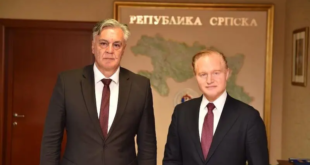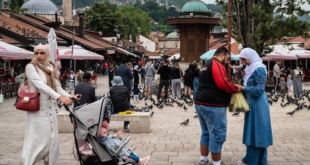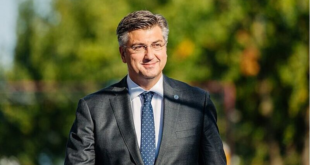The EU and US remain committed to ending the political gridlock in Bosnia, despite the apparent failure of their joint diplomatic initiative earlier this month, officials said.
EU and US representatives moved to dispel fears that they were abandoning talks on Bosnia’s future, saying that their senior technical experts were returning to the country next week to try and help its estranged political leaders overcome their differences.
Sweden’s ambassador to Bosnia, Bosse Hedberg, told journalists that discussions with political leaders from the country’s Croat, Muslim and Serb communities were already underway, but at a lower level than previously. Sweden currently holds the rotating EU Presidency.
“Our position has not changed, the United States and EU remain committed to helping Bosnia,” the US ambassador to Bosnia, Charles English, told journalists.
The leaders of Bosnia’s strongest political parties have participated in a series of high-level talks on how to revamp their country’s constitution.
However, following the meetings, held at the Butmir military camp near Sarajevo on October 9, 20 and 21, six of seven local leaders refused to back a reform package presented to them by Swedish Foreign Minister Carl Bildt and US Deputy Secretary of State James Steinberg.
Bosnian Serbs rejected the reforms as too drastic, while most Bosniak (Bosnian Muslim) and all Bosnian Croat representatives described them as insufficient. Only the president of the ruling Bosniak Party of Democratic Action, SDA, Sulejman Tihic, tentatively accepted the package, saying he feared that rising tensions and even conflict were possible if the reform initiative failed.
In the wake of the inconclusive Butmir talks, top Bosnian Serb leader Milorad Dodik said repeatedly that Serbs were no longer willing to take part in any internationally sponsored talks.
Dodik reiterated his stance that the so-called Butmir package was “unacceptable even as a foundation for talks” after meeting with English in Banja Luka on Thursday. However, Dodik confirmed that he was willing “to continue to talk with political leaders in Bosnia”, a statement from his office said.
Dodik’s explicit rejection of international mediation, coupled with statements made by Bildt following the EU Council meeting on Tuesday, prompted some in Bosnia, including Tihic, to voice fears that the EU was no longer willing to push Bosnian leaders to prepare their administration for closer ties with the bloc.
However, the SDA stated Thursday that it was reassured of the ongoing EU commitment to engagement following Tihic’s Brussels meetings with EU foreign policy chief Javier Solana and his top advisor Robert Cooper.
“Solana and Cooper have agreed that continued [EU] engagement in the Butmir initiative is necessary […] as well as that the proposed package is a rational […] solution,” which could encourage further reforms, the party said in a statement.
Tihic, who also serves as deputy speaker of the Bosnian parliament’s upper house, addressed the EU summit in Brussels on Thursday.
“I am aware that EU and US leaders […] are already a bit tired of Bosnia and Herzegovina, but our country has achieved significant progress,” since the end of its 1992-95 war, Tihic reportedly said.
“It is our shared success because without your support we could not have made it […] please support the joint EU-US initiative in order for Bosnia to become a functional and prosperous EU and NATO member country,” he said.
 Eurasia Press & News
Eurasia Press & News



